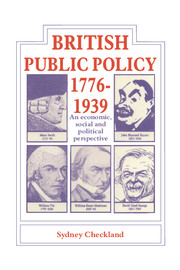Book contents
- Frontmatter
- Contents
- Preface
- Introduction
- Part I Industrialisation and war, 1776–1815
- Part II Assimilating the industrial revolution, 1815–51
- Part III The Victorian apogee, 1851–74
- Part IV Industrial maturity and the ending of pre-eminence, 1874–1914
- 9 The continued freedom of the market mechanism; the state-induced changes in its operating conditions
- 10 Land and rule in England, Wales, Scotland and Ireland
- 11 The emergence of a public sector, chiefly at the local government level
- 12 The assertion of the power of labour in industry and politics
- 13 Welfare and the social democratic urge
- Part V Total war and troubled peace, 1914–39
- Bibliography
- Index
9 - The continued freedom of the market mechanism; the state-induced changes in its operating conditions
Published online by Cambridge University Press: 05 August 2012
- Frontmatter
- Contents
- Preface
- Introduction
- Part I Industrialisation and war, 1776–1815
- Part II Assimilating the industrial revolution, 1815–51
- Part III The Victorian apogee, 1851–74
- Part IV Industrial maturity and the ending of pre-eminence, 1874–1914
- 9 The continued freedom of the market mechanism; the state-induced changes in its operating conditions
- 10 Land and rule in England, Wales, Scotland and Ireland
- 11 The emergence of a public sector, chiefly at the local government level
- 12 The assertion of the power of labour in industry and politics
- 13 Welfare and the social democratic urge
- Part V Total war and troubled peace, 1914–39
- Bibliography
- Index
Summary
The late Victorian and Edwardian challenges
From the 1870s Britain's world economic dominance waned; indeed some scholars detect deceleration of economic growth as beginning as early as the 1860s. Britain's high Victorian lead over trade rivals, especially Germany and the USA, shrank; by 1900 it had gone. The country was entering upon the phase of industrial maturity, in some ways presenting its governments with problems more intransigent than those of the first industrial revolution. Cereal agriculture was in serious difficulty, causing landed incomes based on rents to fall. France was replaced in the 1890s as the great disturber of continental stability by Germany, a nation whose aggressiveness, inspired by a newly found political unity, had at its disposal the means of making war on a scientific and industrial basis.
Mr Gladstone's first Home Rule Bill of 1886 made Ireland the dominant and most divisive issue in British politics. Large additions were made to the empire, especially in Africa. The Boer War (1899–1902) shocked the British people, for it was no easy task to subdue guerrilla fighters on their home ground. Out of it came a new imperial philosophy, closely related to concern with national health and efficiency at home. The challenge to modernise India prompted the Morley–Minto reforms of 1909, intended to carry the subcontinent toward self-government.
The women made their bid for the vote, some of them employing violence.
- Type
- Chapter
- Information
- British and Public Policy 1776–1939An Economic, Social and Political Perspective, pp. 163 - 184Publisher: Cambridge University PressPrint publication year: 1983

